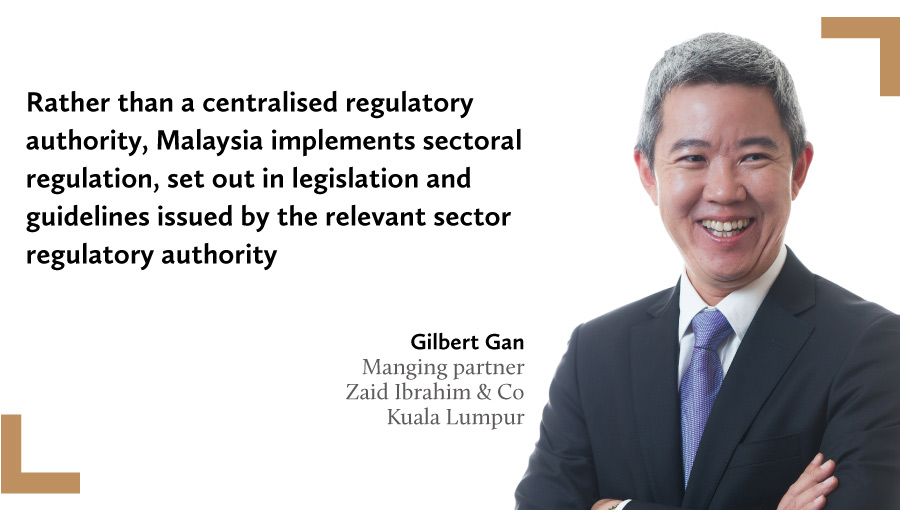Malaysia has shown inner strength to overcome multiple recent trials, emerging as a contender for global investment and learning to prosper despite troubles in regional and global theatres. Putro Harnowo reports.
T
he year of the tiger, 2022, proved to be a monumental one for Malaysia as the country dealt with challenges on geopolitical and public health fronts.
Three different prime ministers took office in the past three years while navigating an economic roller coaster. After the onset of the pandemic caused the economy to contract by 5.5% in 2020, Malaysia’s gross domestic product bounced back 3.1% in 2021 before roaring ahead by 8.7% last year – the fastest pace in more than two decades.
After the world reopened from the covid pandemic, increasing tensions have emerged between the two biggest economies, but Malaysia has stood out by finding the middle ground and accommodating both China and the US.
According to the Malaysian Investment Development Authority (MIDA), China was the top investor in 2022, accounting for MYR55.4 billion (USD12.5 billion) approved investment, almost twice as much as the runner-up, the US, with MYR29.2 billion approved investment. In 2021, China was the third-most approved investor, while the US was not even among the top five.
This trend arguably took off in mid-2021, with Risen Solar Technology of China’s USD10 billion investment pledge, followed by US-based Intel’s USD7 billion investment plan in late 2021. In March, Amazon said it would allocate USD6 billion to build data centres in Malaysia, while China is committed to investing MYR170 billion, as announced by Malaysia’s Prime Minister Anwar Ibrahim following his visit to Beijing in the same month.
In April, the World Bank’s chief economist for East Asia and the Pacific, Aaditya Mattoo, said that the Regional Comprehensive Economic Partnership trade agreement had helped deepen China’s integration with much of the region. Trade restrictions between the US and China also led to increased exports to certain economies, including Malaysia.
The country’s strategic location, commitment to economic development and attractive market potential make it an appealing destination for foreign investors.
Asia Business Law Journal discussed the country’s upward trajectory with legal experts in Kuala Lumpur, with several acknowledging the crucial role of the government’s proactive policies on liberalisation, tax and investor protection. Nonetheless, some also highlighted domestic regulatory changes and rising concern about environmental, social and governance (ESG) factors as challenges.
“The domestic political crisis did leave a mark for Malaysia as far as the influx of foreign investments are concerned,” says Norhisham Abd Bahrin, a partner at Azmi & Associates. “The resulting political instability gave rise to market uncertainty, which led to risk-averse investors reconsidering their investment interests.”
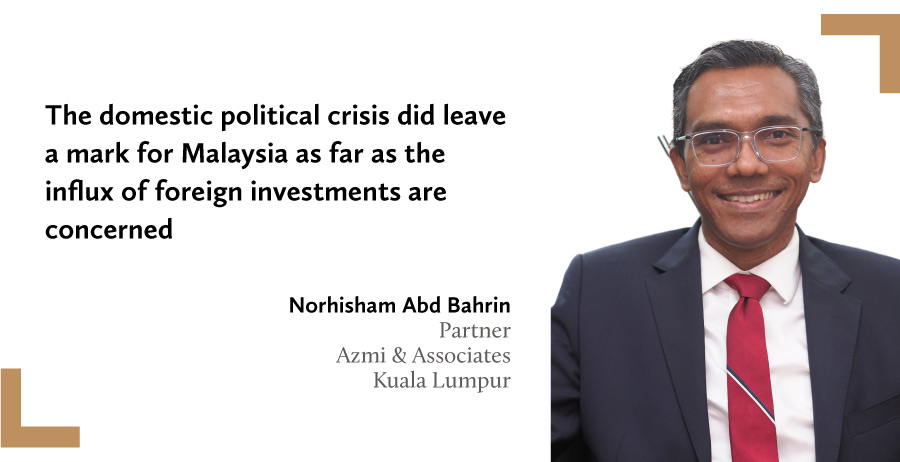
“Now that the nation has moved forward from these uncertain times and re-emerged stronger in the global economic market, its resilience to persevere and grow can be seen as a good investment indicator,” says Bahrin.
Diplomatic dance
In February, the Economist reported 14 Asian economies were ready to replace China at the centre of the global supply chain amid the widening rift with the US. The links in this alternative Asian supply chain are collectively called “Altasia”. Although no single country can match China’s vast manufacturing base, Grace Yeoh, a partner at Shearn Delamore & Co, points to Malaysia’s inclusion in Altasia.
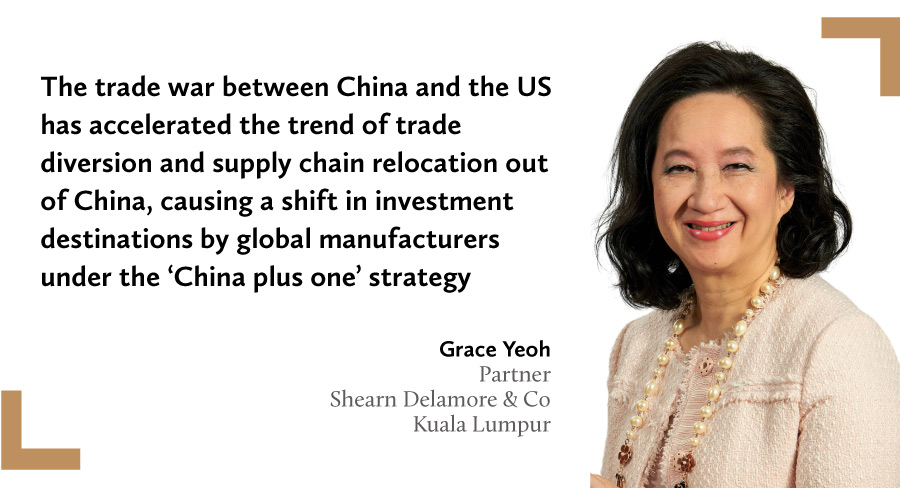
Yeoh says the trade war has contributed to the continued growth of the Malaysian electronics and electrical sectors, including the semiconductor industry. Other industries have also benefited from high US tariffs on Chinese products, creating export opportunities for Malaysian producers.
“Malaysia has been positioning itself as an attractive investment destination, particularly for high-tech industries and manufacturing,” says Saravana Kumar, a partner at Rosli Dahlan Saravana Partnership. “The country’s competitive costs, skilled workforce, infrastructure and geographic location have made it an appealing alternative for businesses affected by the trade war.”
Malaysia External Trade Development, a trade promotion agency, had also expanded its market development grant to include virtual trade promotion activities, adds Kumar.
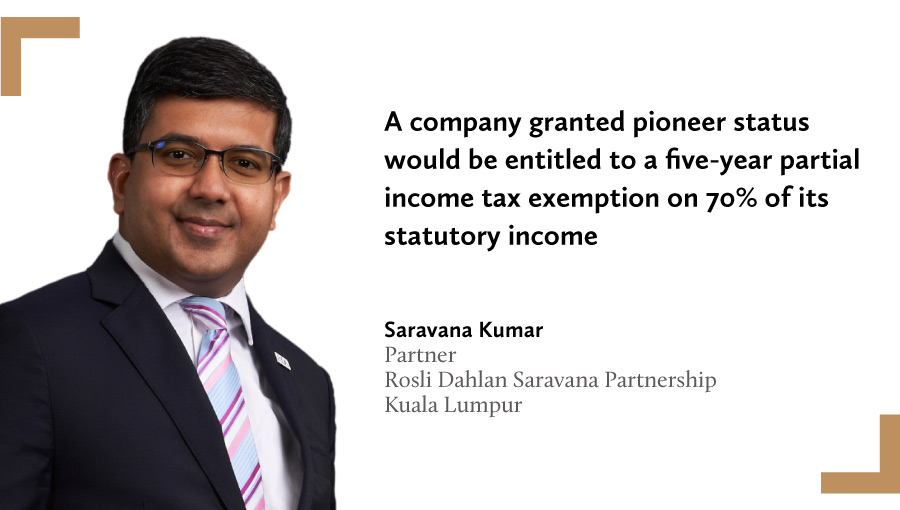
“[Trade tensions] have led to increased competition from other countries such as Vietnam and Thailand as they, too, target the US and Chinese markets,” says Gan.
“Malaysian businesses have had to compete on price and quality to win contracts.”
Trade diversion, resulting from tariffs and trade restrictions, has also created competition in the Malaysian market as Chinese and American companies target Malaysia to maintain their global market share. This, according to Gan, requires local companies to enhance their competitiveness.
Trending fields
In 2022, the services sector accounted for the largest share of total approved investment in Malaysia, amounting to MYR154 billion, followed by MYR84.3 billion for the manufacturing sector. The country’s liberalisation and policy towards equity requirements for investment, supported by its strategic location, have been significant draws.
“At present, investors in the manufacturing sector are required to duly register a Malaysian business entity serving as the investing party, and secure a manufacturing licence in accordance with the stipulations outlined within the Industrial Co-ordination Act, 1975,” says Bahrin, of Azmi & Associates.
“Pertaining to equity holdings, foreign investors can now hold 100% of the equity in all investments in new projects [in the manufacturing sector], as well as investments linked to the expansion or diversification endeavours undertaken by existing companies, regardless of the export volume involved.”
Since 2009, Malaysia has liberalised the services sector, with no equity condition imposed to attract more foreign investment and bring more professionals and technology, as well as to strengthen the competitiveness of the sector.
Service sector investors are also required to register a business entity in Malaysia to conduct investment activities. Depending on the sub-sector and activities undertaken, specific equity conditions may be imposed to obtain the required approvals, licences, permits or registrations by the regulating authority.
Although there are no specific legal threats that may impact business sentiment in Malaysia, Dhanya Sivanantham, an associate at Azmi & Associates, warns industry players and potential investors should take note of the proposed introduction of a merger control regime by the Malaysian Competition Commission (MyCC) through amendments to the Competition Act.
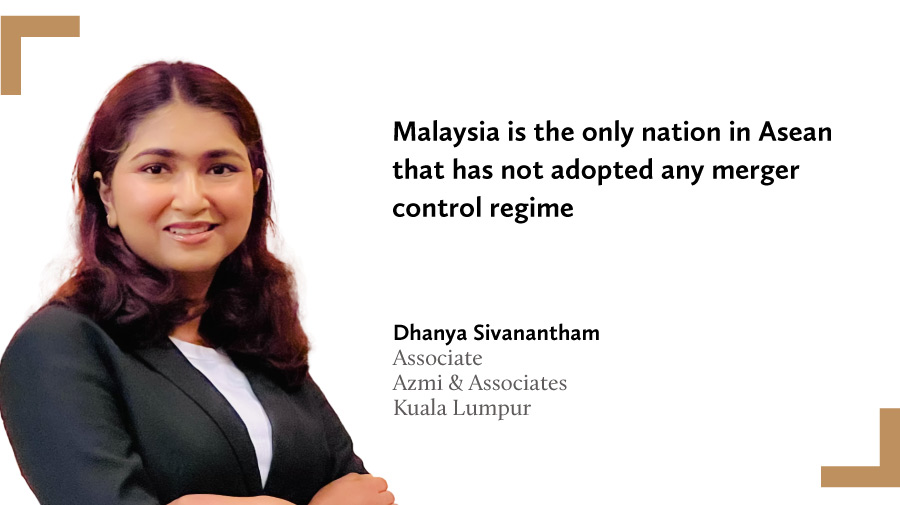
“Through the introduction of the proposed merger control regime, the MyCC intends to prohibit any merger or anticipated merger that may result in a substantial lessening of competition within any market for goods or services.”
You must be a
subscribersubscribersubscribersubscriber
to read this content, please
subscribesubscribesubscribesubscribe
today.
For group subscribers, please click here to access.
Interested in group subscription? Please contact us.




